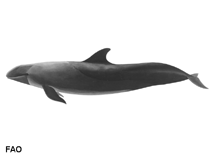Pseudorca crassidens (Owen, 1846)
False killer whale| Native range | All suitable habitat | Point map | Year 2050 |

|
| This map was computer-generated and has not yet been reviewed. |
| Pseudorca crassidens AquaMaps Data sources: GBIF OBIS |
Classification / Names Common names | Synonyms | CoL | ITIS | WoRMS
Mammalia | Cetartiodactyla | Delphinidae
Environment: milieu / climate zone / depth range / distribution range Ecology
Pelagic; oceanodromous (Ref. 75906); depth range 0 - 2332 m (Ref. 116169). Tropical; 90°N - 90°S, 180°W - 180°E
Distribution Countries | FAO areas | Ecosystems | Occurrences | Introductions
Atlantic Ocean, Mediterranean and Indo-Pacific. Tropical to warm temperate.
Length at first maturity / Size / Weight / Age
Maturity: Lm ?, range 366 - 427 cm Max length : 600 cm TL male/unsexed; (Ref. 1394); 500 cm TL (female); max. published weight: 2.0 t (Ref. 1394)
Life cycle and mating behavior Maturity | Reproduction | Spawning | Eggs | Fecundity | Larvae
Main reference
References | Coordinator | Collaborators
Tan, J.M.L. 1995 A Field Guide to the Whales and Dolphins in the Philippines. Makati City: Bookmark. 125 p. (Ref. 936)
IUCN Red List Status
(Ref. 130435: Version 2025-1)
CITES status (Ref. 108899)
CMS (Ref. 116361)
Threat to humans
Human uses
Fisheries: commercial
FAO - Fisheries: landings, species profile | FishSource | Sea Around Us
Tools
More information
Max. ages / sizes
Length-weight rel.
Length-length rel.
Length-frequencies
Mass conversion
Abundance
Internet sources
BHL | BOLD Systems | CISTI | DiscoverLife | FAO(Fisheries: species profile; publication : search) | Fishipedia | GenBank (genome, nucleotide) | GloBI | Gomexsi | Google Books | Google Scholar | Google | PubMed | Tree of Life | Wikipedia (Go, Search) | Zoological Record



